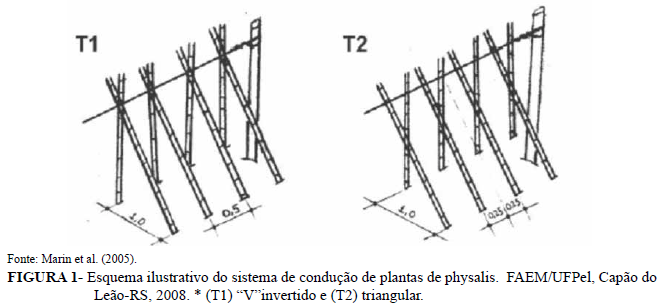A species that is being introduced in the plantations of small fruits is the cape-gooseberry. The Solanaceae is considered a rugged plant that is difficult to maintain its upright stems; its fruits are in a glass that protects against insects, birds, and adverse conditions. This objective of this work was to evaluate the physicochemical characteristics of Physalis peruviana fruits according to different sepal colors and the used training systems. The fruits were harvested and classified in five different sepal color groups: 1 (green), 2 (green-yellowish), 3 (yellow-greenish), 4 (yellow), 5 (yellow-brownish); and two training system groups: inverted "v" and triangular. The experimental design was completely randomized in a factorial scheme 5x2 (sepal colors x drive systems). The experimental unit was composed of ten fruits, with each treatment repeated three times. The data were submitted to variance analysis (ANOVA) by applying the Tukey test at a 5% level of probability of error for the comparison of the means. The appraised variables were: fruit, sepals and total fresh mass, diameter, firmness, epidermis color, total soluble solids (TSS), total titratable acidity (TTA), the TSS/TTA ratio and pH. The triangular training system associated with yellow and yellowbrownish sepals resulted, respectively, in fruits with more SST and better TSS/TTA ratio. The highest mass and diameter values were obtained in cape-gooseberry fruits with yellow-brownish sepals, while the highest total mass was reached when sepals had yellow color. For sepals mass, the largest responses were obtained with the green sepals. From this physicochemical characterization we can conclude that cape-gooseberry picked g from the third color phase (yellow-greenish) present the best physiochemical characteristics in both assessed training systems.
Physalis peruviana; fruit; harvest; triangle system; inverted "v" system







